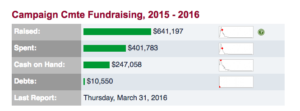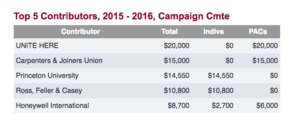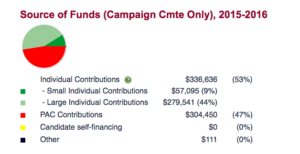A Closer Look at Bonnie Watson Coleman’s Campaign
Bonnie Watson Coleman was elected to serve as the U.S. Representative for New Jersey’s 12th congressional district in 2015, becoming the first black woman to serve in Congress. Residing in Ewing Township, New Jersey, her democratic views match those of Ewing residents.
Coleman’s campaign is one that is not unfamiliar to people of New Jersey and the United States. Not only is she the first black woman to serve in Congress, but she is also the first woman to lead the State party when she was elected Chair of the New Jersey Democratic State Committee in 2002.
Coleman has been able to generate support from residents of her township and created motivation through areas of interest that she fights for, such as women’s rights and economic fairness for the retired. Having her influence in these has contributed to donations.
Coleman was able to raise $641,197 from 2015-2016, according to opensecrets.org
Coleman’s campaign statistics (opensecrets.org)
For her campaign, she had spent $401,683, but was able to walk away with $247,058 in cash on hand. As seen above, her debts came out to be a little over $10,000, as of March 2016.
But this information is only useful when those who contributed to the Coleman campaign have been made public. The top contributors to her campaign were UNITE HERE; Carpenters & Joiners Union; Princeton University; Ross, Feller & Casey; and Honeywell International, donating thousands of dollars, some sums of money being sponsored through PACs and others individually.
The top contributors of Coleman’s campaign (opensecrets.org)
But when the sources of these donations and funds are broken down even further, interesting information is revealed. According to data on opensecrets.org, Coleman financed her campaign based on donations from outside parties alone. If this information is correct, then there was no self-financing involved in Coleman’s campaign.
Source of funds for Coleman’s campaign (opensecrets.org)
According to the infographic above, 0% of her funds came from self-financing. $111 funds came from another category listed as “other.” That category is left anonymous and doesn’t provide the voter with the information of who was being the $111 that was contributed.
The recent Citizen’s United decision effected campaign financing and where candidates receive funds from. This decision made it so that funds can be funneled through Super PAC’s–unlimited funds. These funds can be spent on ads and more to sway voters to vote for or against a candidate. No names or amount of money donated has to be disclosed.
This is similar to Coleman’s “other” category. It is unclear what that source of funding is and where the $111 came from because it is not disclosed. But it doesn’t necessarily have to be. If this source of funding was happening through Super PAC’s, the $111 wouldn’t even be listed.
If you look at the city data for Ewing Township, numerous residents are actively donating to campaigns, and donating more than once. These contributions are being donated by working people and those retired, and are being donated repeatedly throughout the years. This shows that the residents of Ewing, NJ, are actively participating in political campaigns and are contributing to political parties to support favored candidates.
Donors from Ewing, NJ, and the contributions made for 2011/2012 (citydata.com)
Contributions from residents has decreased from years prior and information has not been updated for 2015-2016.
Despite Ewing being a mostly democratic township, there has been repeated donations toward the Republic National Committee throughout the year. Albeit along with those donations came donations towards the Democratic National Committee, and the occasional donation for Hillary Clinton’s Presidency (donated in 2009 by a Ewing resident).





